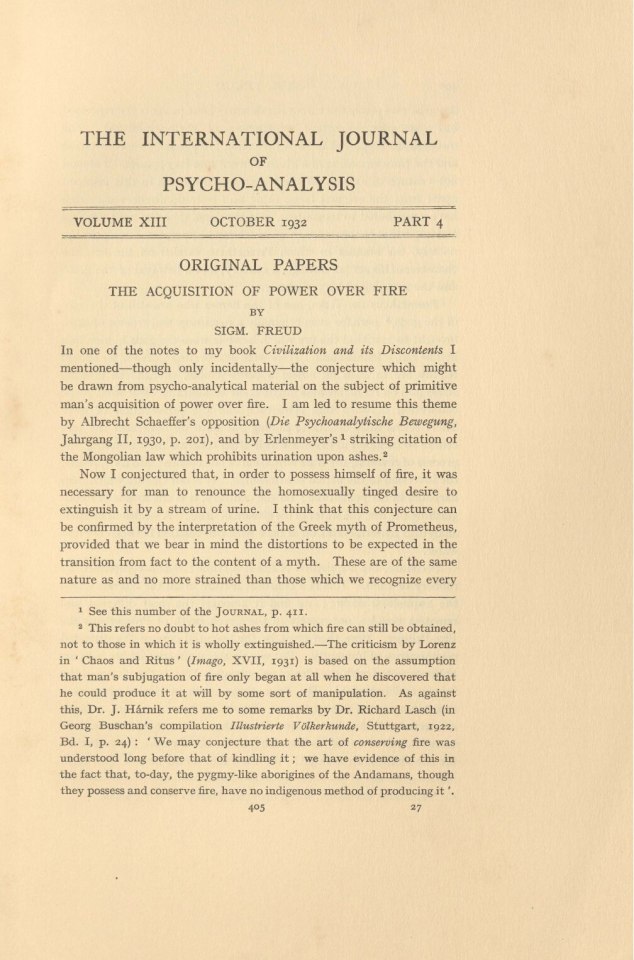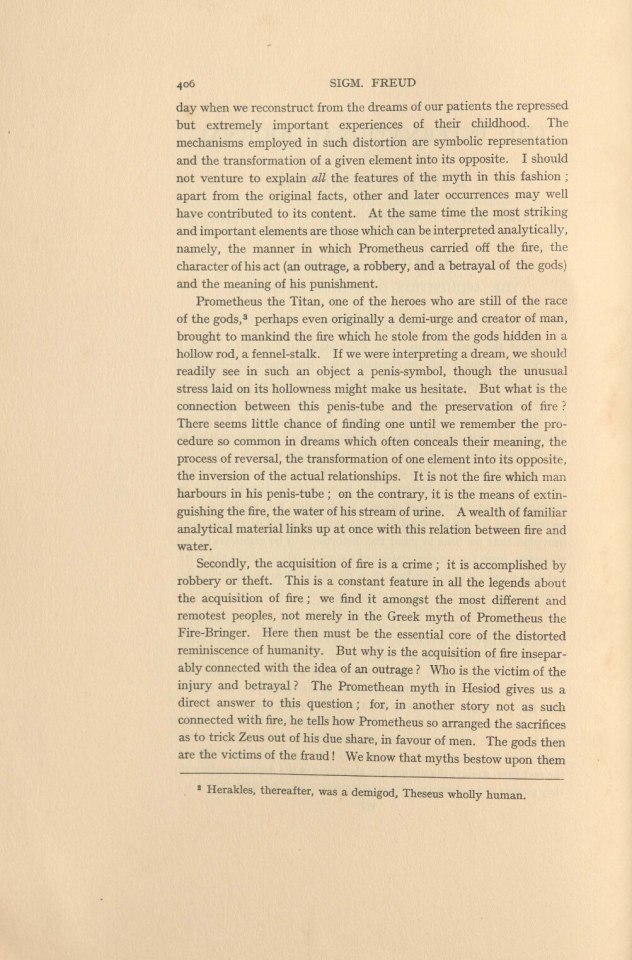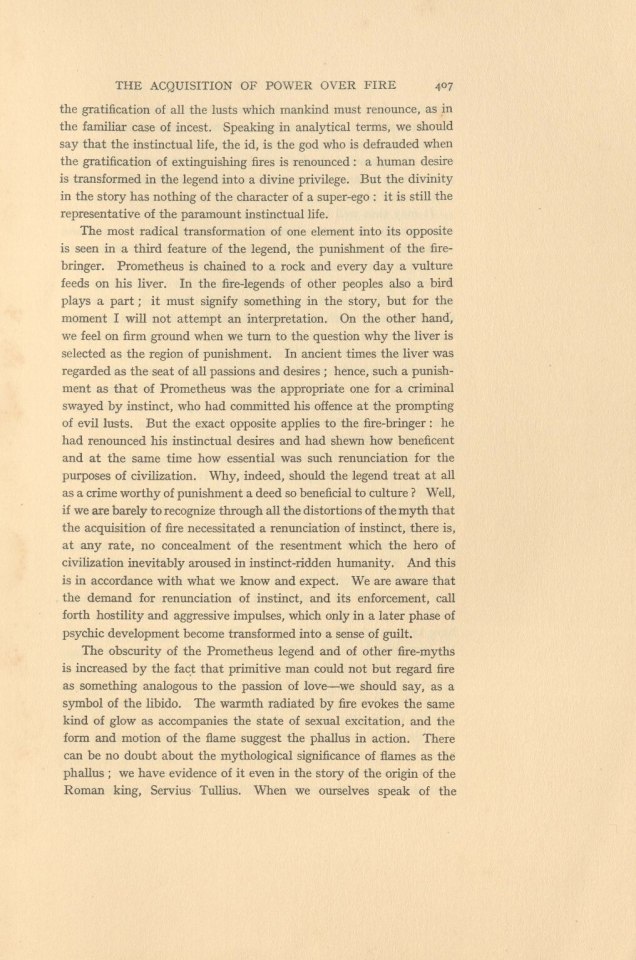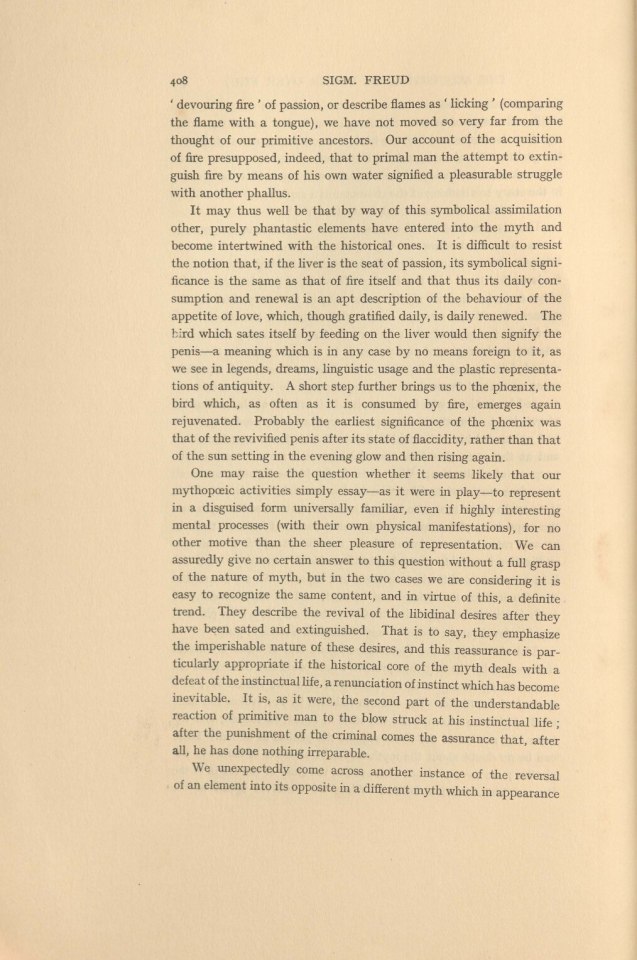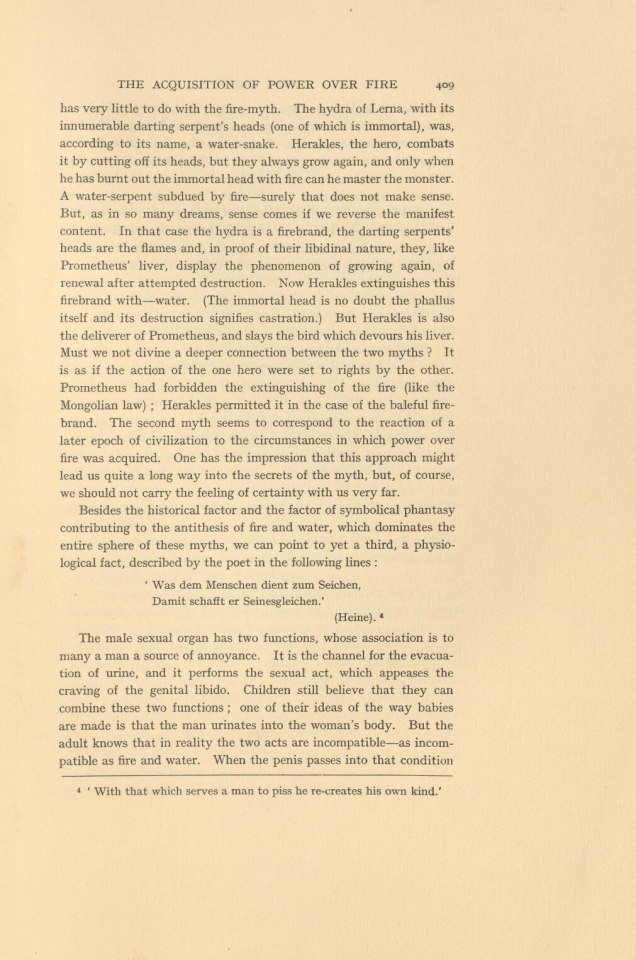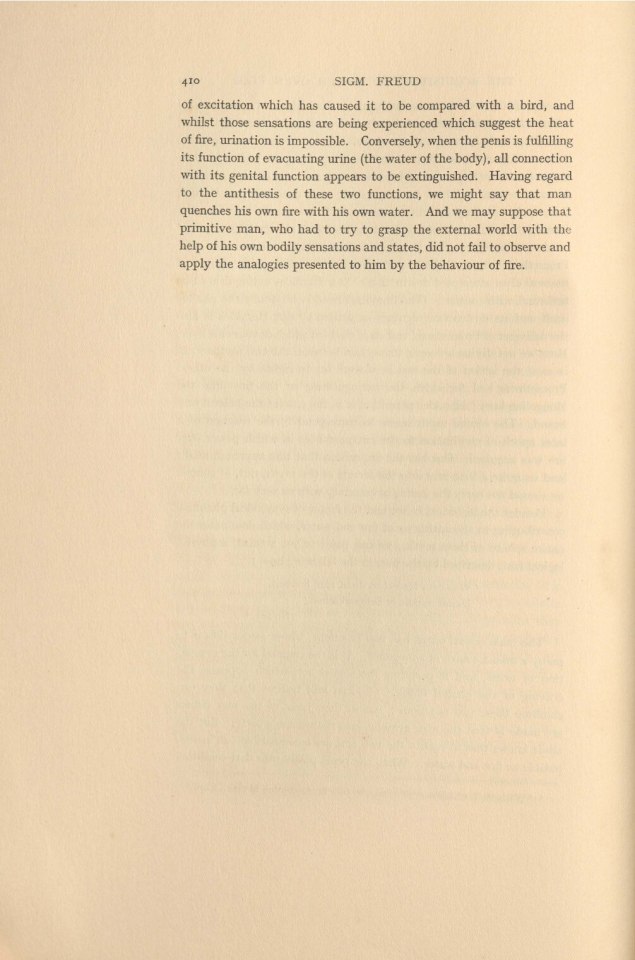S.
THE INTERNATIONAL JOURNAL
OF
PSYCHO-ANALYSIS
OCTOBER 1932
PART 4
VOLUME XIII
ORIGINAL PAPERS
THE ACQUISITION OF POWER OVER FIRE
BY
SIGM. FREUD
In one of the notes to my book Civilization and its Discontents I
mentioned though only incidentally-the conjecture which might
be drawn from psycho-analytical material on the subject of primitive
man's acquisition of power over fire. I am led to resume this theme
by Albrecht Schaeffer's opposition (Die Psychoanalytische Bewegung,
Jahrgang II, 1930, p. 201), and by Erlenmeyer's 1 striking citation of
the Mongolian law which prohibits urination upon ashes.2
Now I conjectured that, in order to possess himself of fire, it was
necessary for man to renounce the homosexually tinged desire to
extinguish it by a stream of urine. I think that this conjecture can
be confirmed by the interpretation of the Greek myth of Prometheus,
provided that we bear in mind the distortions to be expected in the
transition from fact to the content of a myth. These are of the same
nature as and no more strained than those which we recognize every
1 See this number of the JOURNAL, p. 411.
2 This refers no doubt to hot ashes from which fire can still be obtained,
not to those in which it is wholly extinguished.-The criticism by Lorenz
in Chaos and Ritus' (Imago, XVII, 1931) is based on the assumption
that man's subjugation of fire only began at all when he discovered that
he could produce it at will by some sort of manipulation. As against
this, Dr. J. Hárnik refers me to some remarks by Dr. Richard Lasch (in
Georg Buschan's compilation Illustrierte Völkerkunde, Stuttgart, 1922,
Bd. I, p. 24) 'We may conjecture that the art of conserving fire was
understood long before that of kindling it; we have evidence of this in
the fact that, to-day, the pygmy-like aborigines of the Andamans, though
they possess and conserve fire, have no indigenous method of producing it'.
27
405
S.
SIGM. FREUD
406
day when we reconstruct from the dreams of our patients the repressed
but extremely important experiences of their childhood.
mechanisms employed in such distortion are symbolic representation
and the transformation of a given element into its opposite. I should
not venture to explain all the features of the myth in this fashion;
apart from the original facts, other and later occurrences may well
have contributed to its content. At the same time the most striking
and important elements are those which can be interpreted analytically,
namely, the manner in which Prometheus carried off the fire, the
character of his act (an outrage, a robbery, and a betrayal of the gods)
and the meaning of his punishment.
The
Prometheus the Titan, one of the heroes who are still of the race
of the gods, perhaps even originally a demi-urge and creator of man,
brought to mankind the fire which he stole from the gods hidden in a
hollow rod, a fennel-stalk. If we were interpreting a dream, we should
readily see in such an object a penis-symbol, though the unusual
stress laid on its hollowness might make us hesitate. But what is the
connection between this penis-tube and the preservation of fire?
There seems little chance of finding one until we remember the pro-
cedure so common in dreams which often conceals their meaning, the
process of reversal, the transformation of one element into its opposite,
the inversion of the actual relationships. It is not the fire which man
harbours in his penis-tube; on the contrary, it is the means of extin-
guishing the fire, the water of his stream of urine. A wealth of familiar
analytical material links up at once with this relation between fire and
water.
Secondly, the acquisition of fire is a crime; it is accomplished by
robbery or theft. This is a constant feature in all the legends about
the acquisition of fire; we find it amongst the most different and
remotest peoples, not merely in the Greek myth of Prometheus the
Fire-Bringer. Here then must be the essential core of the distorted
reminiscence of humanity. But why is the acquisition of fire insepar-
ably connected with the idea of an outrage? Who is the victim of the
injury and betrayal? The Promethean myth in Hesiod gives us a
direct answer to this question; for, in another story not as such
connected with fire, he tells how Prometheus so arranged the sacrifices
as to trick Zeus out of his due share, in favour of men. The gods then
are the victims of the fraud! We know that myths bestow upon them
2 Herakles, thereafter, was a demigod, Theseus wholly human.
S.
THE ACQUISITION OF POWER OVER FIRE
407
the gratification of all the lusts which mankind must renounce, as in
the familiar case of incest. Speaking in analytical terms, we should
say that the instinctual life, the id, is the god who is defrauded when
the gratification of extinguishing fires is renounced: a human desire
is transformed in the legend into a divine privilege. But the divinity
in the story has nothing of the character of a super-ego; it is still the
representative of the paramount instinctual life.
The most radical transformation of one element into its opposite
is seen in a third feature of the legend, the punishment of the fire-
bringer. Prometheus is chained to a rock and every day a vulture
feeds on his liver. In the fire-legends of other peoples also a bird
plays a part; it must signify something in the story, but for the
moment I will not attempt an interpretation. On the other hand,
we feel on firm ground when we turn to the question why the liver is
selected as the region of punishment. In ancient times the liver was
regarded as the seat of all passions and desires; hence, such a punish-
ment as that of Prometheus was the appropriate one for a criminal
swayed by instinct, who had committed his offence at the prompting
of evil lusts. But the exact opposite applies to the fire-bringer: he
had renounced his instinctual desires and had shewn how beneficent
and at the same time how essential was such renunciation for the
purposes of civilization. Why, indeed, should the legend treat at all
as a crime worthy of punishment a deed so beneficial to culture? Well,
if we are barely to recognize through all the distortions of the myth that
the acquisition of fire necessitated a renunciation of instinct, there is,
at any rate, no concealment of the resentment which the hero of
civilization inevitably aroused in instinct-ridden humanity. And this
is in accordance with what we know and expect. We are aware that
the demand for renunciation of instinct, and its enforcement, call
forth hostility and aggressive impulses, which only in a later phase of
psychic development become transformed into a sense of guilt.
The obscurity of the Prometheus legend and of other fire-myths
is increased by the fact that primitive man could not but regard fire
as something analogous to the passion of love-we should say, as a
symbol of the libido. The warmth radiated by fire evokes the same
kind of glow as accompanies the state of sexual excitation, and the
form and motion of the flame suggest the phallus in action. There
can be no doubt about the mythological significance of flames as the
phallus; we have evidence of it even in the story of the origin of the
Roman king, Servius Tullius. When we ourselves speak of the
S.
SIGM. FREUD
408
' devouring fire' of passion, or describe flames as ' licking' (comparing
the flame with a tongue), we have not moved so very far from the
thought of our primitive ancestors. Our account of the acquisition
of fire presupposed, indeed, that to primal man the attempt to extin-
guish fire by means of his own water signified a pleasurable struggle
with another phallus.
It may thus well be that by way of this symbolical assimilation
other, purely phantastic elements have entered into the myth and
become intertwined with the historical ones. It is difficult to resist
the notion that, if the liver is the seat of passion, its symbolical signi-
ficance is the same as that of fire itself and that thus its daily con-
sumption and renewal is an apt description of the behaviour of the
appetite of love, which, though gratified daily, is daily renewed. The
bird which sates itself by feeding on the liver would then signify the
penis a meaning which is in any case by no means foreign to it, as
we see in legends, dreams, linguistic usage and the plastic representa-
tions of antiquity. A short step further brings us to the phoenix, the
bird which, as often as it is consumed by fire, emerges again
rejuvenated. Probably the earliest significance of the phoenix was
that of the revivified penis after its state of flaccidity, rather than that
of the sun setting in the evening glow and then rising again.
One may raise the question whether it seems likely that our
mythopoeic activities simply essay-as it were in play-to represent
in a disguised form universally familiar, even if highly interesting
mental processes (with their own physical manifestations), for no
other motive than the sheer pleasure of representation. We can
assuredly give no certain answer to this question without a full grasp
of the nature of myth, but in the two cases we are considering it is
easy to recognize the same content, and in virtue of this, a definite
trend. They describe the revival of the libidinal desires after they
have been sated and extinguished. That is to say, they emphasize
the imperishable nature of these desires, and this reassurance is par-
ticularly appropriate if the historical core of the myth deals with a
defeat of the instinctual life, a renunciation of instinct which has become
inevitable. It is, as it were, the second part of the understandable
reaction of primitive man to the blow struck at his instinctual life;
after the punishment of the criminal comes the assurance that, after
all, he has done nothing irreparable.
We unexpectedly come across another instance of the reversal
of an element into its opposite in a different myth which in appearance
S.
THE ACQUISITION OF POWER OVER FIRE
409
has very little to do with the fire-myth. The hydra of Lerna, with its
innumerable darting serpent's heads (one of which is immortal), was,
according to its name, a water-snake. Herakles, the hero, combats
it by cutting off its heads, but they always grow again, and only when
he has burnt out the immortal head with fire can he master the monster.
A water-serpent subdued by fire-surely that does not make sense.
But, as in so many dreams, sense comes if we reverse the manifest
content. In that case the hydra is a firebrand, the darting serpents'
heads are the flames and, in proof of their libidinal nature, they, like
Prometheus' liver, display the phenomenon of growing again, of
renewal after attempted destruction. Now Herakles extinguishes this
firebrand with water. (The immortal head is no doubt the phallus
itself and its destruction signifies castration.) But Herakles is also
the deliverer of Prometheus, and slays the bird which devours his liver.
Must we not divine a deeper connection between the two myths? It
is as if the action of the one hero were set to rights by the other.
Prometheus had forbidden the extinguishing of the fire (like the
Mongolian law); Herakles permitted it in the case of the baleful fire-
brand. The second myth seems to correspond to the reaction of a
later epoch of civilization to the circumstances in which power over
fire was acquired. One has the impression that this approach might
lead us quite a long way into the secrets of the myth, but, of course,
we should not carry the feeling of certainty with us very far.
Besides the historical factor and the factor of symbolical phantasy
contributing to the antithesis of fire and water, which dominates the
entire sphere of these myths, we can point to yet a third, a physio-
logical fact, described by the poet in the following lines:
'Was dem Menschen dient zum Seichen,
Damit schafft er Seinesgleichen.'
(Heine). 4
The male sexual organ has two functions, whose association is to
many a man a source of annoyance. It is the channel for the evacua-
tion of urine, and it performs the sexual act, which appeases the
craving of the genital libido. Children still believe that they can
combine these two functions; one of their ideas of the way babies
are made is that the man urinates into the woman's body. But the
adult knows that in reality the two acts are incompatible-as incom-
patible as fire and water. When the penis passes into that condition
4 With that which serves a man to piss he re-creates his own kind.'
S.
SIGM. FREUD
410
of excitation which has caused it to be compared with a bird, and
whilst those sensations are being experienced which suggest the heat
of fire, urination is impossible. Conversely, when the penis is fulfilling
its function of evacuating urine (the water of the body), all connection
with its genital function appears to be extinguished. Having regard
to the antithesis of these two functions, we might say that man
quenches his own fire with his own water. And we may suppose that
primitive man, who had to try to grasp the external world with the
help of his own bodily sensations and states, did not fail to observe and
apply the analogies presented to him by the behaviour of fire.
ijp-xiii-1932-4
405
–410
